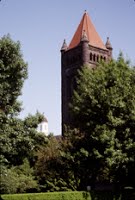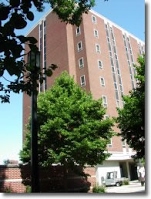Algebra, Geometry and Combinatorics Day (AlGeCom) is a one day,
informal meeting of mathematicians from the
University of Illinois, Purdue University, IUPUI, and nearby universities, with interests in algebra,
geometry and combinatorics (widely interpreted).
Algecom is supported by the NSF.
Further details will be posted here as they become available. Or you may
contact the University of Illinois organizers
Hal Schenck and Alexander Yong, or the Purdue organizers
Uli Walther
and Saugata Basu or IUPUI organizers Evgeny Mukhin and Vitali Tarasov
Date: Apr 27, 2013
Location: Room IT167 in the IT Building (Informatics & Communications Technology
Complex) at IUPUI in Indianapolis.For a map, click here. Coffee-breaks will be held in the hallway on the first floor.
Speakers and schedule : These are in Eastern Standard Time!!!
Indianapolis is NOT on Chicago time.
Coffee and pastries
F. Sottile (Texas A/M) 9:30-10:30h Title: Galois groups of Schubert problems
Abstract. Work of Jordan from 1870 showed how Galois theory can be applied to
enumerative
geometry. Hermite later showed that a geometric monodromy group associated
to
a problem in enumerative geometry is equal to the Galois group of an
associated
field extension, and in 1979 Harris applied this to study the Galois groups
of
many enumerative problems. Vakil gave a geometric-combinatorial criterion
that
implies a Galois group contains the alternating group. With Brooks and
Martin
del Campo, we used Vakil's criterion to show that all Schubert problems
involving lines have at least alternating Galois group. White and I have
given
a new proof of this based on 2-transitivity.
My talk will describe this background and sketch a current project
to systematically determine Galois groups of all Schubert problems of
moderate
size on all small classical flag manifolds, investigating at least several
million problems. This will use supercomputers employing several overlapping
methods, including combinatorial criteria, symbolic computation, and
numerical homotopy continuation, and require the development of new algorithms and
software.
M. Mazin (Stony Brook) 11-12h
Title: Topology and combinatorics of Jacobi factors
Abstract: We study topology of subvarieties of Grassmannians, consisting of subspaces
invariant under the action of two commuting nilpotent operators. These
varieties play an important role both in algebraic geometry and
representation
theory. In algebraic geometry they are know as Jacobi factors of plane curve
singularities (a local version of the compactified Jacobians of singular
curves). In representation theory, the same varieties are known as affine
Springer fibers.
In some special cases these varieties can be decomposed into complex affine
cells, enumerated by Young diagrams, with the dimensions of cells computed
in
a combinatorial way. The resulting theory turns out to be related to the
theory
of bivariate deformation of Catalan numbers introduced by Garsia and Haiman
(q,t-Catalan numbers) and its generalizations. There are many interesting
connections: to representation theory of rational Cherednik algebras,
homological knot invariants of torus knots, etc.
The talk is based on a joint work with Eugene Gorsky.
Lunch
S. Kumar (UNC) 14-15h
Title: A study of the representations supported by the orbit closure of
the determinant
pdf file
Abstract: Let $V$ be a complex vector space of dimension m and let
$E := V\otimes V^* = End V$. Consider $\det\in Q := S^m(E)$, where $\det$ is
the function taking determinant of any $X\in\End V$. The group $G = GL(E)$
canonically acts on $Q$. Let $\X$ be the $G$-orbit closure of $\det$ inside
$Q$. Then, $\X$ is a closed (affine) subvariety of $Q$ which is stable under
the standard homothecy action of $\C$ on $Q$. Thus, its affine coordinate
ring
$\C[\X]$ is nonnegatively graded $G$-algebra over the complex numbers $\C$.
The aim of this talk is to study $\C[X]$ as a $G$-module. The work is
motivated
by the geometric approach initiated by Mulmuley-Sohoni to solve the
Valiant's
conjecture in Geometric Complexity Theory. We relate its study with the
Latin
Square Conjecture due to Alon-Tarsi and an equivalent formulation due to
Huang-Rota called the column Latin square conjecture.
J.S. Kim (Minnesota) 3:30-4:30h
Title: Moments of Askey-Wilson polynomials
Abstract: The Askey-Wilson polynomials are the most general orthogonal polynomials
among
those classified by the Askey scheme. These are orthogonal polynomials in
one variable with 5 parameters. In this talk I will talk about 3
combinatorial
methods to study the n-th moment of the Askey-Wilson polynomials. The first
method is Viennot's theory of weighted Motzkin paths. The second method uses
staircase tableaux introduced by Corteel and Williams. The third method is
a modification of an idea of Ismail, Stanton, and Viennot on matchings and
q-Hermite polynomials. Using the third method we express the n-th moment as
a fraction of two generating functions for certain matchings and obtain
a new formula for the moment. This is joint work with Dennis Stanton.
-------------------------------------------------------------------------------------------------------------------------------------
Parking: Please, park anywhere at the parking lot next to the IT building (except for meters). We will distribute the daily parking permits free of charge, which have to be put on display in each car promptly.
Banquet: This is to be worked out later. Support: There is some support (hotel, airfare/car rental) for graduate students to attend. Funding decisions will be made by March 25, 2013. Those applying are requested to fill out the following form and email it to the local organizer Vitaly Tarasov at the following email address: vt@math.iupui.edu 1. Name: 2. Organization: 3. Brief summary of research interests: 4. Approximate expenses: and have their advisor email a letter of support to the same address vt@math.iupui.edu. (Fill it out during or the conference and return to Alex Yoong, and mail receipts later to the address supplied.) Yours sincerely, Evgeny Mukhin, Henry Schenck, Saugata Basu, Vitaly Tarasov, Uli Walther, Alexander Yong"
|
|


